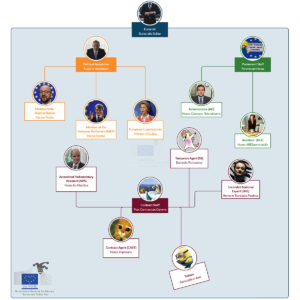
The term Eurocrat (from the combination of “European” and “bureaucrat”) broadly indicates any official working for the European Union; it may have both a negative and a positive connotation, depending on who is speaking.
In the EU-Bubble, for example, becoming a eurocrat means reaching a superior state of being, comparable to what Nirvana is for Eastern religions. Such a quest might require decades of your life and often one proceeds by steps, moving through the different levels of Eurocracy.
Contract Staff
According to naturalists, people belonging to this group have one feature in common: the inability to pass the EPSO TestThe EPSO test is a popular lottery of the European Institutions, with incredible prizes such as permanent jobs, pompous titles, generous salaries and unspeakable benefits. Many people try their luck every year, moving around the intricacies of the registration process, passing through the lengthy selection procedures and surviving the hell.... At the lowest layer we find traineesWhile everybody else was thinking of becoming an astronaut or a princess, a trainee, as a child, had only one dream: "Working in the European Institutions". And they never gave it up! They sent their cv, they filled in creative motivation letters, they learned to use the ugly ECAS website,... (eurocrats in fieri, sometimes known as eurobrats) who spend most of their short lives (about 5 months) trying to evolve into contract agentsBecoming a Contract Agent (abbr. CA) is the first step to become a eurocrat. You just need to perform the following tasks: • Be invited to a CAST Competition (hint: networking is required). There are several that grant you access to a certain functional group (e. g. FG I to... butterflies, or CAST (homo implorans). Those who fail can still get a consolation prize, becoming intramurosIntramuros (abbr. IM) are the most normal people you can meet in the corridors, as they have never been institutionalized (both meanings apply). They are usually unaware of anything concerning the European Union or the hierarchies but you can still meet them in Plux. They do not properly belong to... or interimaireInterimaire are trainees that failed to become Contract Agents and ended up in the institutions' purgatory: they work hard, pay taxes on their salary (the ultimate Eurocrat's shame), and have a weekly renewable contract with some greedy service provider. On top of that they receive permanent staff emails, in which....
Temporary AgentsTemporary Agents (abbr. TA) are the unicorn of the institutions, as they are very rare (they make up around 2% of the institution staff) and only a few people had the privilege of meeting one. They have the same salaries and benefits of an administrator but can enjoy them only... (bastardis fortunatus) are the unicorns of the Eurocratic world, because they are very rare (some say they don’t even exist). Their contract lasts no more than 3-4 years, but, as they have permanent staff benefits, they try to enjoy life at its fullest.
Accredited Parliamentary Assistants (homo ex machina) only exist in the European Parliament ecosystem, while Seconded National ExpertSeconded National Experts (abbr. SNE) are like the Erasmus students of the institutions: they already work in the administration of a member state and are lent to the European Union for a short period of time (from a few months to a couple of years). So they have to move... (homo in translatio perditus) are borrowed by national states, like in an Erasmus for adults.
Permanent Staff
Charles Darwin identified the rule of the EPSO selection as the main evolutionary mechanism that lead to the Permanent Staff (Foreveropithecus), which is divided between Administrators (homo calamum tetendissens) and Assistants (homo ARESponshabilis). Both type of contracts are without an expiration date, are linked to similar tasks, receive similar benefits but have very different salaries. Because of that, one of the species is known to live a happier life than the other.
Political Appointees
Located at the top of the food chain, the Political Appointees (a patria mandatus) are the faces behind the eurocracy, and they enjoy all the fame and glory that come with it.
EU countries Representatives (patriae fidelis), against any evolutionary logic, spend their time fighting petty wars, thus failing to cater for the well-being of their communities.
Members of the European Parliament (homo electus) are directly elected by the European citizens, and they usually spend their first mandate (five years) to understand how the European Union works. They live in a symbiotic, and often parasitical, relationship with their assistants.
Finally, Commissioners (minister occultus) reign over their policy feuds, supported by their powerful and loyal cabinets. They have authority until they try to exercise it: in that moment they become the scapegoat for all that happens in the EU. On top of that, no journalist is able to pronounce their names correctly.
